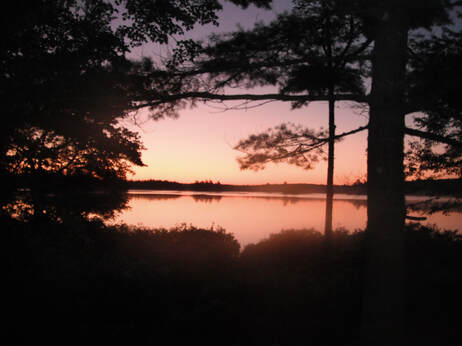AuthorAnne M. Smith-Nochasak: Archives
July 2024
Categories |
Back to Blog
The World According to Musko7/28/2021  Musko had a home, and his home was the Reserve. He chose, however, to go with Julie. He was a watcher and a mentor, a being who appreciated the present and all it had to offer.
“All the same,” Laila sighs. “All the same.” She brightens. “That Musko’s no fool. He’ll see it right.” That is why dogs come to us.
Julie’s head snaps up. The dreams come to her waking now. Soon she will be living in them, everywhere. She walks to the kitchen on rubbery legs, the floor rising and pitching beneath her feet. Musko whuffs at the door. Let’s walk, please. Let’s walk to the brook and wallow in the shady pool above the bridge. There are frogs to hunt and rich smells. Please, let’s go. Then we will stretch out in front of the fridge, and simply be. We will dream of frogs and rabbits and good things.
Musko is the great black dog that chooses Julie. She does not adopt him, and he is not a rescue dog. He had a good life, roaming free on the Reserve, a good and friendly dog, liked by all. I have had people ask me, when I go north on a contract, to bring them back a dog. They even describe the type they want, like the community was perhaps a pet shop and I would browse the aisles, seeking their dog. Some dogs are looking for a home, but some are happy just the way they are. It is important to learn the difference. Musko had a home, and his home was the Reserve. He chose, however, to go with Julie. He was a watcher and a mentor, a being who appreciated the present and all it had to offer. I believe Julie needed him to find her way through her dream life, and his presence was a gift. As the world darkens around us, as we strive to suck each moment dry of all opportunity, we need the guidance of dogs. The other day as the heat pulsed around me, as CoVid numbers rose and fires scorched the earth, I came upon my husky, napping in front of the fan, four paws splayed to the breeze, eyes closed, husky smile playing about her mouth. “Today we have a fan,” she explained. “Let’s enjoy it, shall we?” How did this special bond with humans come to be? I believe that Musko might tell it like this: The Creator looked over all that he had made, and his heart broke. For there was strife and violence over the earth, and the hearts of humans had turned to darkness. Rage, selfishness, and despair were everywhere. Many were seduced by the power of evil, and many brought low. And then he saw his crowning achievement, the joy of his creation, Dog. And the Creator wept, for Dog was in chains, his eyes dulled, his spirit broken. How could this be? How could all the beauty and balance of the First Time come down and down to this? So he gathered Dog and all his companions, and reached deep into their hearts. Some were too broken, and these he kept with him, to be healed in the fresh forests of another world, to be renewed that they might one day return. To the others, he gave a blessing and said, “I give you the strength to endure. I send you to seek out the broken among the humans, and lead them to find their hearts. You will listen, and you will lead. I send you, Dog, and your followers, to teach my people to be better human beings. You have patience, forgiveness, hope, and presence – the gifts of creation that they have forgotten. “Your task will be hard, sometimes dangerous. But only you can accomplish this. “Comfort, O comfort my people.” That is why dogs come to you. Perhaps I am fanciful, but then again, it feels good to relax in front of the fan, cool air pulsing against the soles of my feet. I relax and draw down deep into my being. And there I know, that if I can live with patience, forgiveness, hope, and presence, I can change a tiny bit of the world. And that is a start. Thank you, Musko.
2 Comments
Read More
Back to Blog
No Marginal Love: A Parable7/21/2021  But children are truth, and the truth will not be buried. It will call itself forth. And when the day of reckoning came, the earth heard and brought them forth. The earth itself called out for justice. “Now I am pounding and screaming through the thick planks and there are voices on the other side, but they are chatting about something else. My story is important, I am screaming. Listen to it. Their voices are muffled, but I think that they are telling their own stories. Or perhaps they are telling their own story of me, a distorted story, and I am not really in it at all.
“They have their story of the owl, as it was for them. “I know the real story, and I need one person to understand it…” --Rachel, A Canoer of Shorelines, p.124 Wasaya is a healing place, a gentle, affirming setting, but Rachel misses much of the joy by indulging her human need to be understood – to have someone tell her that yes, she is doing it right; she belongs. Really, how often are we truly understood? In all honesty, would this understanding improve our lives? Rachel would initially be relieved to meet this one person who understands her, but I believe that she would soon be looking for another, if only to confirm the findings of the first. Jean Vanier sees the human condition so well in Becoming Human : We have compulsive needs: to win, to control, to be loved. Likewise we have compulsive fears: inner blockages, fears of some relationships, of conflict. These compulsions push us forward but they also constrain us. They close us in on ourselves, make us blind to our own limits and brokenness, and to the beauty and gifts of those who are different. Under the control of our compulsions, others can quickly become a threat: they stand in the way of the love or success we seem to need so badly. (P. 113) On a basic level, we miss our own lives when we indulge in these needs. On a more dangerous level, we can ruin the lives of others. Here is a parable about giving in to the compulsion to win, to control, to be loved: There were once lost people who roamed the earth, going back and forth. They looked upon a new people and said, “Let us make them over in our image.” They did not stop to think that making things in one’s own image was actually the right of the Creator. The lost people turned to this new people, and saw that they were marginalized, weak, and vulnerable. They formed a picture of how these new people must be remade. They consulted their books, and found approval for their quest. It would be easy, because they had power in the land. And they saw that it was good. These new people resisted mightily, for the picture forced upon them was strange and frightening. They had their own picture, their own story, and this was alien. They did not see themselves as a new people, for they had been present from the very beginning. The lost people were angry, because the new people would not do what was best for them. The best was, without doubt, their way. Look upon us, the lost ones demanded, and see that we are worthy. Let us take their children, they decided. It will be easy to remake the children. They will forget their ways, and crave our enlightenment. Thus the dark scheme began. Behold, the children wept in the night. Some died of grief, some of neglect, others through acts of violence. All suffered and were broken under the hands of the lost ones. This was a shame on the lost ones, so they tried to bury the knowledge. The lost people hid the children in the ground, and walked away. But children are truth, and the truth will not be buried. It will call itself forth. And when the day of reckoning came, the earth heard and brought them forth. The earth itself called out for justice. For the children were always loved, always beautiful, always perfect. And the rest of the parable lies in the future. To win, to control, to be loved: we group these together. If we win, if we are in control, then we will be approved. We will be loved! However, love is not something we achieve; it is something we recognize and embrace. It is present. We always had it. We just didn’t notice. When we surrender to the awareness that we are loved, we can begin. I turn again to my favourite quote from Henri Nouwen’s Here and Now: “Joy is the experience of knowing that you are unconditionally loved and that nothing… can take that love away.” To find joy in our own lives and in the lives of others, we must surrender our compulsions. All we need is the discovery that we are loved anyway, and that although none of us truly fit in, we all belong. Creation flows through us and around us; the breath that moved over the waters in the beginning is the breath that stirs the trees around us and the same breath that flows through each of us. We are one, and we belong. If only the lost people had remembered that they were loved unconditionally and from the beginning, then they would have walked with the new but ancient people, and the times and memories would have been gentle, like the sunrise over Rachel’s cove. The children had known this unconditional love; it was embedded in their birth. And that is why they will ever be present.
Back to Blog
From the Ashes of the Fifties7/14/2021  In those days, a visit from the priest was a holy moment, and you could not receive sanctifying grace wearing shorts and clutching a cigarette. There were undisputed rules that governed you, but I recall the mischief and tongue in cheek of those moments. Perhaps that has helped me to grow old with a little honest grace, to see with both eyes open. In the background there is a clattering and scraping as chairs are shoved back and ashtrays are flung beneath the sink. There is a glimpse of slim legs flashing up the stairs, shorts riding over thighs, as my mother and her younger sister, my dear Aunt Claudette, run gasping out of sight.
Now Father is standing on our driveway flanked by the Sisters, so much black fabric and Roman collar and wimple dazzling in the evening. My mother and Aunt Claudette pop through the screen door, breathless and delighted, now in swishing flowered skirts skimming just below the knee. There is a hint of hidden shorts in their eyes. --Wasaya Journal of Rachel Hardy, A Canoer of Shorelines, pp. 19f. In those days, a visit from the priest was a holy moment, and you could not receive sanctifying grace wearing shorts and clutching a cigarette. There were undisputed rules, but I recall the mischief and tongue in cheek of those moments. Perhaps that has helped me to grow old with a little honest grace, to see with both eyes open. Rachel in A Canoer of Shorelines was born in the nineteen fifties, and so her formative years would be the sixties. This was my generation, too. Hers, like mine, was not a nostalgic journey through poodle skirts, marriage to a childhood sweetheart out of high school, and settling down to a modest bungalow with a neat lawn, doilies on the end tables, and years of dedication to church and community ahead. Nor was it a drifting into the sixties world of berets and esoteric jottings, later swirling with psychedelic colours and Trips! We were innocent to the point of naiveté. We did as we were told. We did not dispute obscure truths like “Girls who talk like that wind up in the Convent of the Sacred Heart”, or “The Beatles won’t amount to much.” At the age of eight when I witnessed the rise of the Beatles on the Ed Sullivan Show, I planted my shuffling feet firm, and scoffed at their disgraceful hair. In my secret heart, I was at the edge of the stage screaming my adulation, but I was not going to wind up in convent school. I suppose that I could say that our parents manipulated us. However, in most instances it was for our own good. The woods, for example, are not a safe place for children to roam. Perhaps it was unfair of my parents to provide a particularly menacing version of a children’s song about picnicking teddy bears, but I know I never went into the woods alone – I had no desire to discover a swarm of glassy-eyed teddy bears lurching toward me from the shadows, zombie-like arms extended. Yes, that song stayed with me, a subliminal message planted by protective parents. I was sixteen and carrying a shotgun before I comfortably entered the woods on my own. The teddy bears were out there, at least until six o’clock when their parents took them home. We did not question these things, but when it came to important truths we were not gullible. Our access to television was limited to preserve our innocence, but our permitted shows were rife with violence and racism. Somehow, we accepted that what was happening was not real, and that if we drove off cliffs, we would not get up and start again. We had also seen real dynamite used in blasting stumps, and knew that if we stood on that stump, we would not wipe the soot and ashes from our faces and light the fuse again. We watched The Beverly Hillbillies, but did not emerge with a belief that grandmothers concocted moonshine and that mental challenges were a laughing matter. Personally, I worried over Jethro, and hoped that he would be safe. We experienced things which touched us then ebbed away. In Grade one, we all sang with great gusto a most unusual song in which the protagonist mistook a man of colour for a horse. I felt puzzled, because the difference between a horse and a man should have been obvious. I recall that the teacher planned a float for our class in the parade, in which we would all be in dark face and seated in a watermelon patch. The plan was to make us look cute and funny. I was not comfortable; I thought this was an odd thing to do. We watched the original Peter Pan cartoon and were confused. Who were these strange beings pretending to be Indigenous and doing it so badly? Did they know how to work ash? The questions we should have asked were: “Who are the people that come up with these things? Why do they think these are funny? What are they telling us to believe? Who does believe them? Are they still among us?” Did my parents sing racist songs, chuckle over racist movies, honestly believe that we were safe because they unsettled us with creepy songs? I do not think so. They were the types who greeted the priest with an impish smile, sinful shorts defiant under pious skirts. They were polite, but not intimidated. They were the moral compass that taught us to love the people of the world. I know that they were that moral compass because, by imitating them, I can be that moral compass for my grandchildren. We can overcome our literal fifties naiveté; we do not have to be racists even if it was woven into our education. We can reach beyond the twisted stories, imitate the loving moments and the courageous moments that we were taught, and witness the birth of the world. For now, though, I must set this rambling aside. It is six o’clock, and I feel like a walk in the woods.
Back to Blog
Self-publishing Unfiltered7/7/2021  Doug, in A Canoer of Shorelines, is not someone who sees the point of view of the other. Doug does not care about the point of view of the other. The world belongs to Doug, and the opinion of others is only there to serve him. Doug is full of dreams and plans, and he sees your view as simply academic. “So. When do you think you’ll be heading out again?” Julie asks, for by now she is not just concerned, she is anxious.
Doug shakes his head, grimacing. “I’m sorry, but I thought we were clear on this. I thought we were going to try again.” “No,” Julie replies. “I just said you could stay, you know, until –“ “Precisely. You did. And now, here I am.” Doug grins. “I’d say that this is a good start.”
What does Doug have to do with self-publishing? Nothing, really. But Doug is out there, and as you set forth on the marketing road on your journey, as you writhe to bring your novel into the world, you will meet him. Self-publishing is an exciting adventure, and soon your peers are celebrating sales and successes. Meanwhile your cousins and friends have bought your book and shared your news on Facebook. One has penned an amazing review. They are not what we call “market influencers”, but they are in your corner. That is important. The local store reports your success. They have already sold three books! And it has only been three weeks. You are excited to see that you have many followers on Instagram now! Your inbox is filled with messages of support, and although on one level it is flattering to hear that your book is awesome, on another you worry about PayPal and hurt feelings. You are a master of the Review Query, and have a media kit worthy of a Great Work. All you need is a Great Work to accompany it. Somehow you schedule your first book signing to coincide with the book launch in a neighbouring town of a well-known local author. You are curled in a cozy section of a bookstore that pulses with love of books, chatting with other struggling writers about writer’s block, self-publishing, and the books we love. You book a farm market again because you had a great visit last time – and discover that it coincides with the anticipated tropical-storm-with-significant-damage. You plan to pack a cross saw, because trees fall across your road with alarming frequency. You have limited Internet access at the best of times; with the arrival of leaves and humidity, your signal becomes intermittent. You open promising sites, and the wheels spin. You are weary of “Check your Internet,” because you have no Internet. You scoop up lap top and portable Wi-Fi and race for the car, the dogs bounding behind you. “A car ride! A car ride! Yep! We’re going on a car ride.” You crowd them back into the house, dropping keys. The screen protector slips from your phone in the heat and slides between the slats in the deck. You leave it behind, needing to find a signal before your lap top expires. Now you are on the hill, and the temperature is 34 0C. Soon your Wi-Fi refuses to operate; it is hot to the touch. Your lap top announces that the battery is at critical low, and urges you to plug it in. You scream to the unfeeling universe that your lap top is too old for this service, and then you race for home to charge it up. You know that when you return, the signal will have moved on. You know that the Internet signal is not sentient, but you curse against a pitiless sky anyway. You have opted to launch during the Third Wave, and you had a virtual book launch all planned. Now, you know that it will never happen, because no one wants to stare at an empty screen. You send messages and cheery updates and blog notifications instead, and begin to suspect how your marketer friends on Instagram feel when you ignore them. Your business page will not let you post, and finally you begin to realize that the fault does not lie with Facebook. You have to log in from the browser. Just like you told people when you worked at the call centres and they didn’t like it either. Between the moments, Doug steps in to orchestrate. Doug does not feel that you are trying hard enough. “Don’t listen,” your true friend urges; “just get your book out there -- you can concentrate on pre-Christmas sales with what you are learning now.” Doug has ambitions involving marketing your literary novel at the adult shop in town; your friend suggests you follow the farm markets and the stores where you have discovered a kindred love of books, a possible family connection (You wore your well-loved Labrador t-shirt to a fascinating little store, and the proprietor was from Labrador!), independent book stores who will do anything to help a new author, and many reasons to smile. You discover the people that your book was written for. And you know that it is not a great book but it is a good book, because they are good people. You awaken early one morning to a five-star review that is being posted on Twitter. Someone else is willing to undertake a review, someone who knows places that are special in the book. The Woodstock of farm markets has offered you a space. An email arrives late at night welcoming your book to a terrific little gift shop. The dogs have forgiven you for leaving them behind when you were on your car ride. Your life is moving forward. You have met incredible people and had great conversations. You have been reviewed and interviewed, and when you add up the sales, you realize that progress has been slow but steady. Doug is not happy with these accomplishments. You are not selling many books, he reminds you. You sure didn’t organize this one! You didn’t plan. Did you think to do a marketing plan? How about a media kit? Doug was not there during the long hours you and FriesenPress put into these! Perhaps he was doing inventory in the attic? Then Laila steps in, and her words ring across the lake: A satisfied mind is the measure of success. You listen to that one who makes sense; never mind that Doug. Self-publishing is a wonderful, painful, joy-filled journey. Too bad, Doug, that you missed the fun.
Back to Blog
Canadian Dream for Every Child7/1/2021  Tina is the one for whom I will always grieve. She is gifted, yet only her disability is documented. She is sensitive to the world, yet the world turns against her and breaks her.... Please do not try to lock Tina into your reality. She has her own reality. In one dream room
I am the dark one. I am marked. I am hated. I am their puzzle and the pieces do not fit. … In my dream room I am myself. Outside my dream room No one understands my puzzle. They cannot see The pieces all lock into place And I am a Good Life. -from Tina’s dream room poem, A Canoer of Shorelines, pp. 250f. Tina is the one for whom I will always grieve. She is gifted, yet only her disability is documented. She is sensitive to the world, yet the world turns against her and breaks her. Which one of your students is she? She must be from one of those places? Please do not try to lock Tina into your reality. She has her own reality. Tina is the one on the edges, the one without a partner in gym class, the one with no group on the field trip, the one who does her own project; the one that students avoid or joke about. She is the one that teachers worry over, for in her presence they feel helpless. Which one of my students is she? Tina is Every Child. Every Child is a good starting point for a reflection on Canada Day. Canada Day is meant to celebrate all that has made this country great. This presupposes that the country was not great before “Canada” came into being through the political machinations of the nineteenth century. The history of disease, exploitative trading practices, environmental degradation, and negligence (particularly in the area of education), however, speaks for itself. Many people are coming forward and saying that they will not celebrate Canada Day; it feels wrong to cheer and celebrate when every day, more bodies of residential school victims are being revealed. They, like Tina, are Every Child. They look to us, bewildered, trying to understand what they have done to be so hated. They were pieces of the puzzle that did not fit – and for that, they were swept away. They call to us, and until there is justice, how can there be celebration? So what do we celebrate this day? This can be a learning day, a day on which we stand on the ashes and build. Not rebuild, please, because that sounds like we want to have the same structure again. Instead, listen to the ones who are mourning; sit with them, hear them. Grow from their stories. Prepare to change, for history has many hidden layers, which must be explored. Let this day be a starting point for our entire future. Let this be a day that lives on, that is not shelved and over in a week’s time. I am reminded of a Grade 8 student, preparing his “poster advertising land in the West for Settlers.” I commented that his draft made it look like the land was empty. Was there no one living there? The eyes narrowed; a mischievous smile played about his lips. The final poster came with the caption: “A deal so good – IT’S A STEAL!!!” Now that is history! Cree history! Since Canada has claimed the land, it stands to reason that Canada must take responsibility for the children buried there. We all have a duty to build a world in which children are valued and have a future. We have a duty to celebrate Every Child. In my last year of teaching, I worked with a very special teacher, always smiling, always with a good word for every student he met. One morning as we were going over educational plans, he shared, still smiling, a few of his “educational experiences.” The smile faded, and he leaned forward, hands clasped, elbows resting on his knees. “Now I ask you,” he said, “was I really such a bad little boy that I deserved to have that done to me?” That is the voice of Every Child, a puzzle that is beautiful and shining, a Good Life that yearns to be affirmed. The puzzle of Every Child is a hard one, but oh, it is sweet to see the pieces come together, after hard work and patience, to see the Good Life. |
ANNE M. SMITH-NOCHASAK

 RSS Feed
RSS Feed
